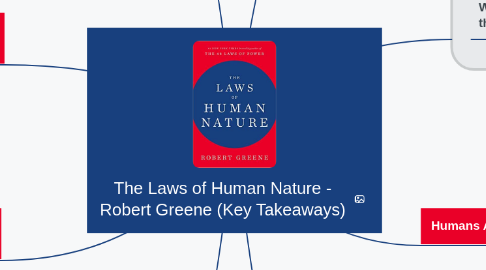
1. Humans Are Short-Sighted and Defensive
1.1. Short-sightedness is natural and goes back to a time when survival was based on immediate concerns, such as where to get the next meal
1.2. What you can do to combat short-sightedness
1.2.1. When making decisions, remember to take a step back and consider the bigger picture
1.2.2. Recognize that today's problems are likely the consequences of past actions
1.2.3. Doing nothing is also an option!
1.2.3.1. In the West it is often seen as a sign of weakness, but the Japanese culture recognizes the wisdom in waiting and see what happens
1.3. People are defensive because they privilege autonomy and free will
1.4. What you can do to deal with people's defensiveness
1.4.1. Make people agree with your plan as though it was their idea
1.4.1.1. Show your appreciation of the other person
1.4.1.2. Validate their individuality and intelligence
2. Humans Are Prone to Feelings of Grandeur
2.1. The Law of Grandiosity
2.1.1. Even small successes can go to people's heads and make them lose touch with reality
2.2. What you can do
2.2.1. Even at the best of times, be aware of contributing factors as well as your own strengths, weaknesses and limit.
2.2.2. Be realistic.
3. Humans Have a Tendency Toward Gender Repression
3.1. We attain our masculinity and femininity both from our genes and our upbringing, but because of society's influence men tend to repress their feminine side and women tend to repress their masculine side.
3.2. We'd be better off embracing the duality within us! This would improve...
3.2.1. Our relationships
3.2.2. Problem-solving skills
3.2.3. Creativity
3.2.4. Confidence
4. Humans Are Aggressive
4.1. Our aggressive nature helped make us the dominant species on the planet.
4.2. What you can do
4.2.1. Don't try to repress anger, as this can lead to...
4.2.1.1. Passive aggression
4.2.1.2. Aggression projected inward
4.2.2. Instead, first recognize where the anger comes from
4.2.2.1. Insecurities
4.2.2.2. Domineering parents
4.2.2.3. Childhood trauma
4.2.2.4. Control issues
4.2.3. Accept healthy levels of aggression and put them to good use
4.2.3.1. To fuel ambitions and realize goals
4.2.3.2. To be fearless in pursuing a higher purpose
5. About the Book
5.1. Title
5.1.1. The Laws of Human Nature
5.1.2. What affects your day-to-day life
5.2. Published
5.2.1. October 2018
5.2.2. Viking
5.3. Author
5.3.1. Robert Greene
5.3.1.1. Robert Greene, the #1 New York Times bestselling author of The 48 Laws of Power, The 33 Strategies of War, The Art of Seduction, and Mastery, is an internationally renowned expert on power strategies. He lives in Los Angeles.
5.4. Get it on Amazon
6. Which Questions Does this Book Answer?
6.1. How to get control over your impulses by understanding human nature
6.2. How to use these impulses to your advantage
7. Humans Are Irrational.
7.1. Many decisions we make are simply based on the emotions we feel at the time.
7.2. What you can do
7.2.1. Increase your reaction time. Don't make decisions in the heat of the moment
7.2.1.1. Be calm and patient
7.2.1.2. Balance thinking with emotions
7.2.2. Consider all the possible biases influencing your decision
7.2.2.1. e.g. confirmation bias
7.2.2.1.1. We tend to look for information that supports our existing beliefs
7.2.2.2. e.g. conviction bias
7.2.2.2.1. We think that the stronger our emotions are, the more something must be true
7.2.2.3. e.g. appearance bias
7.2.2.3.1. We think that someone who is good-looking must also be of good character
7.2.3. Biases can lead to bad decisions, so make sure to be:
7.2.3.1. Skeptical
7.2.3.2. Analytical
7.2.3.3. Curious about other viewpoints
8. Humans Are Narcissistic.
8.1. We are all on a spectrum, from healthy levels of narcissism to deep narcissism.
8.2. Narcissism is often wrongly associated with a sense of self-love, but in reality, deep narcissists have low self-esteem and are insecure.
8.2.1. They cope with this by being jealous, controlling and attention-seeking. They can't take criticism. They lack empathy.
8.3. What you can do
8.3.1. To reach a healthier level of narcissism, create a sense of self that you CAN love.
8.3.2. This will make you less insecure.

